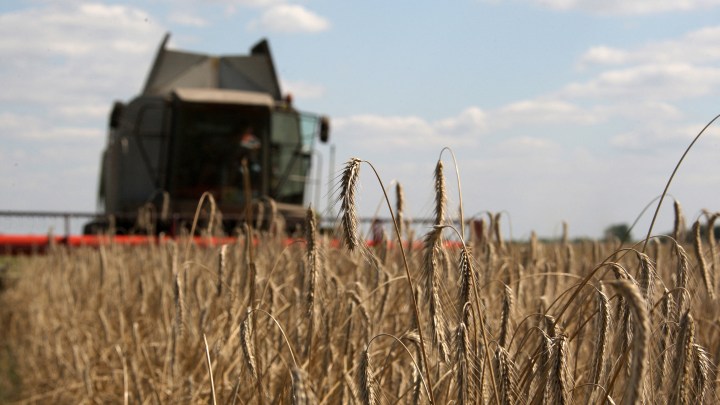
How has the war in Ukraine affected global hunger?

Russia and Ukraine together export a very large percentage of the world’s major grains, including wheat and barley. They also account for about 19% of corn exports and about 80% of the world’s sunflower oil. Experts say the ongoing conflict stands to exacerbate global hunger and food insecurity.
Conflict is a major driver of global hunger.
According to the United Nations World Food Programme, 811 million people go to bed hungry every night. Since 2019, the number of people facing insecurity has more than doubled to 276 million. The war in Ukraine has already hampered the organization’s ability to provide food assistance — 50% of its grain comes from the Ukraine-Russia area.
“When we don’t sort these things out early, we end up paying a thousand times more for that problem,” said Arif Husain, chief economist and director of research, assessment and monitoring at the United Nations World Food Programme.
Husain joined “Marketplace” host Kai Ryssdal to discuss the war in Ukraine, the state of global food insecurity and his organization’s plan is to address the situation. The following is an edited transcript of their conversation.
Kai Ryssdal: People heard up in the introduction, the number of staples, of wheats and grains and oils, that come from Russia and Ukraine combined. It occurs to me, though, that Ukrainian farmers this year — they’re fighting, they’re not farming. And if they don’t get the crop in the ground, that is not a hole that can be made up.
Arif Husain: Well, it’s gonna be really, really tough. So if we take these two countries, together they supply the rest of the world with about 30% of wheat, with about 20% of corn, with about 80% of vegetable oil, like sunflower oil. It’s big. On the wheat side, what is happening is that wheat is already in the ground. On the corn side, corn will be planted pretty soon, or needs to be planted pretty soon. But above all, I think the issue is that even if it is sitting there, how is it going to come out? If no ships are going into the Black Sea, just because they don’t want to take that risk or the insurance premiums are so high. There could be millions of tons sitting there but if they’re not coming out, they’re of no use to the rest of the world, right.
Ryssdal: You’ve been dealing with this for a long time, right, your whole professional life. The preexisting conditions, if you will, of the pandemic and costs and inequality, are not new to you. The war obviously is. So I’m going to guess that, somewhere, the World Food Programme has a plan for what to do in case of a war. But what are you going to do? Because this seems to me to be an insurmountable problem.
Husain: It’s always good to look back in history, right? So one of the questions people were asking me were, “We’ve been here before,” as in, you know, the food and fuel crisis of 2008. Or then again in 2011, you know, the start of the Arab Spring. “So how does this compare to that?” And again, I was like, “It’s worse.” And, “Worse? Why is it worse?” You, you didn’t have a war in Yemen, you didn’t have a war in Syria, you didn’t have a war in Ethiopia, you didn’t have a war in northeast Nigeria, you know, Afghanistan was what it was. In terms of our plan, of course we have a plan. As we speak, we need to help, in 2022, about 145 million people around the world. And the bill to actually do that, the resources needed to actually do that, before this crisis were upward of $18 billion. After this crisis, they are upward of $20 billion. Ask me how much of that we have in our pocket right now, or likely to be secured right now. It’s less than 50%.
Ryssdal: Which is kind of amazing, because — and this is gonna sound ridiculous — but that’s just not a whole lot of money.
Husain: Yeah, exactly. Because, you know, here’s the thing. When you look at the big picture, it’s all almost like, you know, if something happens, if you get sick and it is treated right away, you know, you may sort it out within a matter of days and not really spend a whole lot of money. But if you let it fester, it becomes a bigger and bigger issue where you may even lose a limb, right? We are in that kind of space. When we don’t sort these things out early, we end up paying a thousand times more for that problem.
There’s a lot happening in the world. Through it all, Marketplace is here for you.
You rely on Marketplace to break down the world’s events and tell you how it affects you in a fact-based, approachable way. We rely on your financial support to keep making that possible.
Your donation today powers the independent journalism that you rely on. For just $5/month, you can help sustain Marketplace so we can keep reporting on the things that matter to you.

















